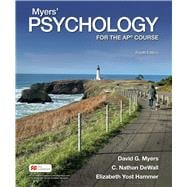About This Book
Myers' Psychology for the AP Course, 4th Edition
Myers' Psychology for the AP Course is a comprehensive textbook designed specifically for Advanced Placement (AP) psychology courses. This book is your go-to resource for a detailed exploration of psychological principles, meeting the scope and sequence requirements for typical AP psychology courses.
Who Uses It?
Primarily, this book is used by students and instructors in AP psychology courses at the high school and college levels. It's also a valuable resource for anyone interested in understanding the basics of psychology, including professionals looking to refresh their knowledge or expand their understanding of psychological principles.
History and Editions
The 4th edition of Myers' Psychology for the AP Course has been updated to address user feedback, incorporating the latest research and discussions in the field of psychology. This edition includes detailed updates on various psychological theories and applications, ensuring that it remains current and relevant for both students and educators.
Author and Other Works
David G. Myers and C. Nathan DeWall are the authors of Myers' Psychology for the AP Course. David G. Myers is known for his engaging writing style and his ability to explain complex psychological concepts clearly and simply. Nathan DeWall brings his expertise in social psychology to the text, ensuring that it covers a wide range of topics relevant to AP psychology courses.
Key Features
- Comprehensive Coverage: The book covers core concepts in psychology, including detailed explanations and examples.
- Updated Research: The 4th edition includes detailed updates on psychological theories and applications.
- Modular Approach: The book is designed with a modular approach, making it easy to adapt to different course structures.
- AP Practice Questions: Each unit includes AP practice questions to help students prepare for the exam.
Detailed Information
ISBNs and Formats
- Hardcover: ISBN-13: 9781319281168
- eTextbook: Available with Achieve (no specific ISBN provided for eTextbook alone)
Rental Options
Various rental durations are available from different retailers, making it convenient for students to access the book in the preferred format.
Publication Details
- Publisher: Worth Publishers
- Publication Date: March 1, 2024
- Number of Pages: 1040
- Language: English
- Item Weight: 6.61 pounds
- Dimensions: 9.4 x 1.55 x 11.2 inches
Other Editions and Formats
Previous editions of Myers' Psychology for the AP Course are available through Worth Publishers and other retailers. For the most accurate and up-to-date information, please refer to the publisher's website or contact their customer service.
Related ISBNs:
No additional ISBNs found for different formats or editions of this specific book. However, the eTextbook is available with Achieve, which can be accessed through the publisher's platform.
This detailed information section provides a quick reference for all the available formats and sources for Myers' Psychology for the AP Course, making it easier to find and access the book in the preferred format.









